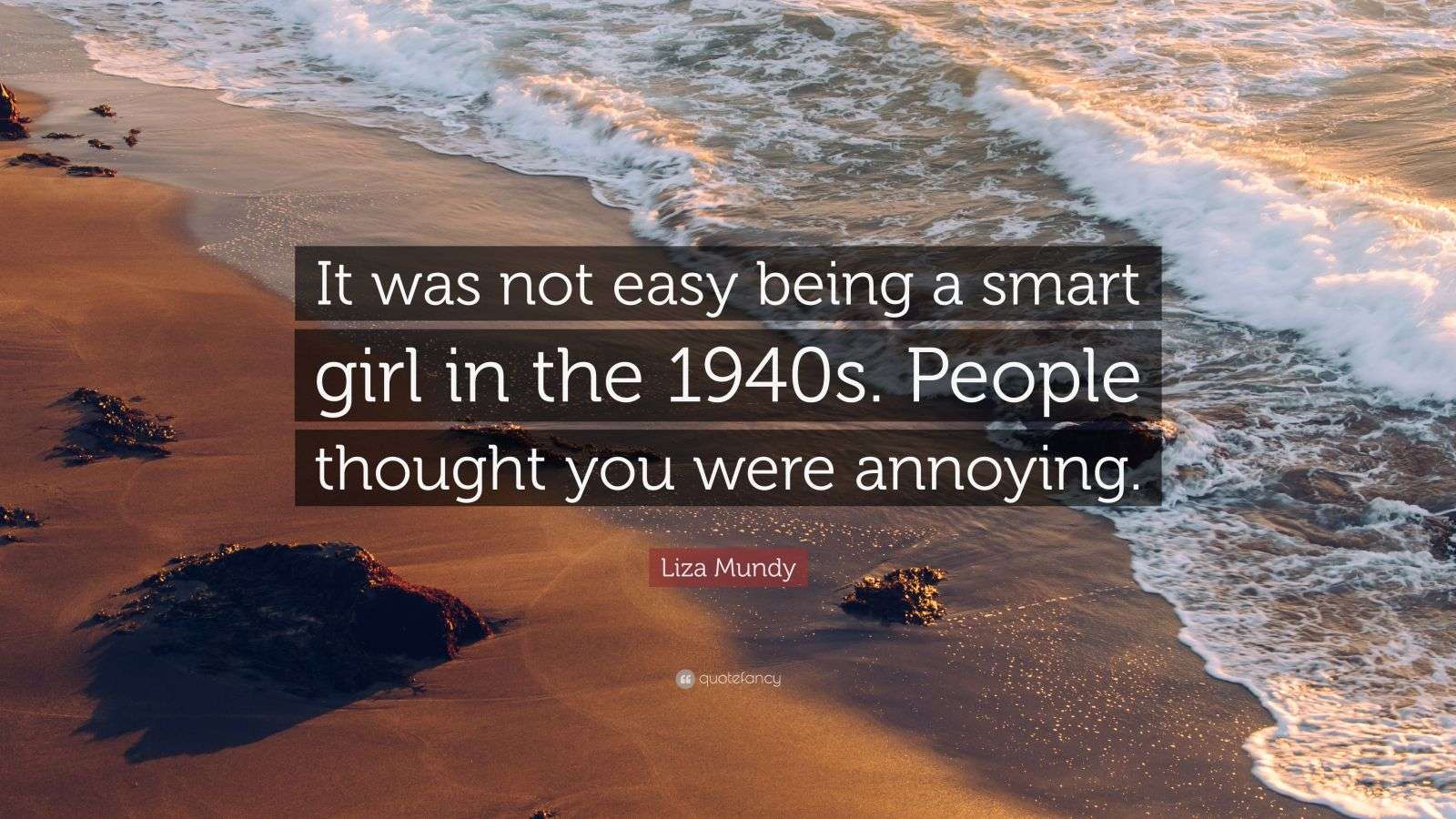Liza Mundy - Exploring Hidden Stories Of Women
Have you ever thought about the untold accounts of women who shaped big moments in history? There are so many narratives that often stay quiet, waiting for someone to bring them to light. Liza Mundy is a writer who has made it her purpose to share these very important stories, pulling back the curtain on lives that truly made a difference. Her work, you see, often centers on women who did extraordinary things, sometimes without much recognition.
She is, in a way, a storyteller who looks for those figures who might have been overlooked in the usual historical records. Her writings, for example, show up in well-known places like The Atlantic, Politico, and The New York Times, among others. She brings a fresh perspective to subjects like women's past experiences, the world of undercover operations, and the workings of government. It's almost as if she has a special ability to find the human heart in what might seem like dry historical facts.
Liza Mundy, actually, has put together several books, each one giving us a deeper look at different aspects of women's contributions. From those who broke secret codes during a big war to women who became the main providers for their households, her writings really cover a wide range of experiences. Her most recent work, for instance, talks about the quiet history of women within a certain intelligence organization, which is quite a fascinating topic. She just has a knack for finding these compelling stories.
Table of Contents
- Liza Mundy - A Look at Her Life and Work
- What Makes Liza Mundy's Stories Stand Out?
- The Impact of Liza Mundy's *Code Girls*
- How Does Liza Mundy Uncover Hidden Narratives?
- Liza Mundy and the CIA - A Secret History Revealed
- What Other Stories Has Liza Mundy Shared?
- How Does Liza Mundy Connect Past and Present?
Liza Mundy - A Look at Her Life and Work
Liza Mundy is, in some respects, a journalist and someone who creates books, known for her deep interest in the lives of influential women across different periods and in government and public life. She was, in fact, a staff writer for a well-known newspaper, The Washington Post, for quite a while. Her background in news gathering, you see, seems to give her a solid base for her extensive research and the way she tells stories. She also spent some time as a senior fellow at a group called New America, which suggests her involvement in bigger conversations about public matters.
Her written works have found homes in many respected publications, including The Atlantic, Politico, The New York Times, The New Republic, Slate, The Guardian, and The Washington Post. This wide reach, you could say, shows her ability to speak to different groups of readers and to cover a variety of subjects. She writes, for instance, about the history of women, the world of spying, and the workings of government for places like The Atlantic, Politico, and Smithsonian. It's clear she has a particular interest in these areas, and that, in a way, makes her work very specific and focused.
She has, as a matter of fact, put together a number of books, each one exploring a unique topic. These include accounts about individuals who broke secret codes, women who were the main financial supporters of their families, a biography of Michelle Obama, and even a book that seems to cover a very wide range of subjects, called *Everything Conceivable*. Her dedication to these subjects, quite frankly, shows a real commitment to bringing lesser-known parts of history to the public eye. It's pretty clear she enjoys telling these kinds of stories.
Personal Details and Background
| Name | Liza Mundy |
| Occupation | Journalist, Author, Former Staff Writer (The Washington Post), Former Senior Fellow (New America) |
| Known For | Books on women's history, espionage, and politics; *Code Girls*; *The Sisterhood: The Secret History of Women at the CIA* |
| Notable Publications | The Atlantic, Politico, The New York Times, The New Republic, Slate, The Guardian, The Washington Post, Smithsonian |
| Bestselling Works | *Code Girls* (National Bestseller) |
What Makes Liza Mundy's Stories Stand Out?
Liza Mundy has a way of making her stories truly memorable, and that, you know, comes from her particular approach to uncovering and presenting information. She doesn't just skim the surface; she actually digs deep into old records and talks to people who lived through the events she writes about. This really thorough kind of investigation allows her to bring out the human element in complex historical situations. It's almost as if she becomes a detective, finding the bits and pieces that make a story feel real and alive for the reader.
Her ability to tell a story is, in some respects, quite remarkable. She takes what could be dry facts and turns them into compelling accounts that pull you in. For instance, when she writes about the women who broke codes during World War II in *Code Girls*, or the women at the CIA in *The Sisterhood*, she doesn't just list events. She gives you a sense of what it was like for those individuals, their challenges, and their triumphs. This focus on the personal side of history is, to be honest, a big reason why her books connect with so many readers.
She has, as a matter of fact, a knack for making sure the core message of these historical events comes through clearly, without getting bogged down in overly academic language. Her writing feels like a conversation, inviting you to learn about these amazing women and their contributions. This style, basically, helps to keep the reader engaged and makes even very detailed historical accounts feel approachable and interesting. She really does have a talent for this.
The Impact of Liza Mundy's *Code Girls*
One of Liza Mundy's very well-known books is *Code Girls*, which tells the story of the young American women who worked to break German and Japanese codes during World War II. This book, you know, brought to light a part of history that was, for a long time, not widely known. These women, recruited from all sorts of places, from fancy women's colleges to quiet towns in the South, played a truly important part in helping to bring the war to an end. It's pretty amazing to think about how many lives they might have saved through their work.
The book, actually, became a national bestseller, which just goes to show how much people wanted to hear this particular story. It reveals, in a way, one of the last remaining big secrets of World War II. Liza Mundy, through her careful research, showed how these women, often working in secret and without much recognition, contributed significantly to the war effort. Their intelligence work was, frankly, a quiet but powerful force that helped change the course of things. It's a testament to their quiet dedication.
Her account of the *Code Girls* also highlights the sheer brainpower and determination these women possessed. They were, in essence, intellectual soldiers, using their minds to fight a different kind of battle. The book gives us a chance to appreciate their skills and their sacrifice, and to understand that contributions to big historical moments come in many forms. It's really quite a compelling story that Liza Mundy tells.
How Does Liza Mundy Uncover Hidden Narratives?
Liza Mundy has a distinct method for finding and presenting these often-overlooked stories. She starts, basically, with extensive research into old documents and official papers, digging through archives to piece together the events. But that's not all; she also conducts many interviews, sometimes with the very people who were there, like the surviving code girls who are now in their nineties. This combination of documented facts and personal accounts, you know, gives her narratives a real sense of authenticity and depth.
This careful work allows her to build what she calls a "dazzling narrative" that truly brings the past to life. She doesn't just report facts; she actually conjures up the atmosphere and the feeling of those times. For instance, she writes about someone like Genevieve Grotjan Aspired, who wanted to be a math professor but couldn't find a university willing to hire a woman back then. This kind of personal detail, you see, helps us connect with the individuals she writes about on a very human level. It's almost like stepping back in time with her.
Her approach, in short, isn't just about what happened, but also about the human experiences and challenges involved. She looks at the "human dramas and dilemmas" that came with scientific developments or historical shifts. This empathetic way of looking at things is, to be honest, what makes her books so powerful. She doesn't assume anything, but rather seeks to truly understand the perspectives of the people whose stories she is telling. It’s pretty clear she cares about these individuals.
Liza Mundy and the CIA - A Secret History Revealed
Liza Mundy's most recent book, *The Sisterhood: The Secret History of Women at the CIA*, takes us into another fascinating part of women's contributions to national security. This book explores how the Central Intelligence Agency, right from its beginnings after World War II, relied on women to do a lot of its work. Yet, at the same time, the agency often tried to control their talents and, in a way, keep them from reaching higher positions. It's a pretty interesting look at how institutions can both use and limit people.
Mundy, in this work, carefully traces the intriguing developments in spy craft and intelligence gathering. But the truly amazing part of her book is her compassionate look at the personal stories and difficult choices that these advances brought about for the women involved. She goes beyond the technical aspects to show the real lives behind the operations. The book, as a matter of fact, has even been considered for adaptation, which shows its wide appeal and the strength of its story. It’s a very compelling read.
Her book also highlights a broader point about how many accounts of America's intelligence agencies often focus on men. Liza Mundy, however, shows that women were absolutely central to the agency's operations, its heritage, its actions, and its accomplishments. She sheds light on the women who fought for their roles and, in a way, changed how spy work was done. It’s a powerful counter-narrative that, you know, really fills in a missing piece of history.
What Other Stories Has Liza Mundy Shared?
Beyond her deep dives into code-breaking and intelligence work, Liza Mundy has also shared other significant stories. She is, for example, the bestselling author of *Michelle, A Biography*, which gives readers a closer look at the life of Michelle Obama. This book, like her others, aims to provide a true account, offering insights into a prominent public figure. It shows her ability to tackle different kinds of biographical subjects, always with a focus on accuracy and depth.
She also wrote *Everything Conceivable: Notes on Writing True Accounts of American History*, which, in a way, gives us a glimpse into her own process as a writer. This book seems to be about the challenges and considerations that go into creating factual historical narratives. It's pretty clear she thinks a lot about how to tell these stories truthfully and effectively. She is, in short, someone who not only tells stories but also reflects on the act of storytelling itself.
Liza Mundy also shares her thoughts and findings through a newsletter called "A Likely Story," which is available on a platform called Substack and has many subscribers. This is another way she connects with her audience and offers more insights into her work and interests. It's a nice, personal touch that allows readers to stay in touch with her ongoing thoughts and discoveries. She really does seem to enjoy sharing her findings with people.
How Does Liza Mundy Connect Past and Present?
Liza Mundy has a way of showing how historical events and figures still matter today. Her writings, which appear in various publications, often draw connections between past happenings and current discussions. For example, around the time of the 100th anniversary of the 19th Amendment's passage, which gave women the right to vote, she would look back at surprising aspects of women's history. This kind of linkage, you know, helps readers see the ongoing relevance of what happened long ago.
She writes for publications like The Atlantic, Politico, and Smithsonian, which are places where current events and historical context often come together. This allows her to share her detailed research with a wide audience that is interested in both what happened and what it means now. Her work on women's history, espionage, and politics, for instance, isn't just about telling old tales; it's about showing how these stories inform our present understanding of society and gender roles. It’s pretty clever, really, how she does that.
Liza Mundy's books, like *Code Girls* and *The Sisterhood*, really highlight how women have consistently fought for their roles and transformed different fields, including something as secretive as spy craft. By bringing these stories forward, she helps us appreciate the quiet revolutions that have taken place throughout history. Her work, in a way, reminds us that the contributions of women have always been there, often just waiting to be properly acknowledged. It’s a very important kind of storytelling.
- Best Actress Nominees 2025
- Update On Missing Girl In Punta Cana
- Jamie Lynn Sigler
- Channing Tatum Wife
- Baby One More Time

Liza Mundy | Hachette Book Group | The NOVL

Liza Mundy

Top 15 Liza Mundy Quotes (2025 Update) - QuoteFancy